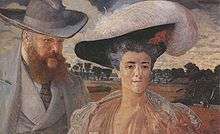Karolina Lanckorońska
| Karolina Lanckorońska | |
|---|---|
|
Lanckorońska as a child, with her father | |
| Born |
11 August 1898 Buchberg am Kamp (de), Gars am Kamp, Austria-Hungary |
| Died |
25 August 2002 (aged 104) Rome, Italy |
| Nationality | Polish |
| Occupation | Countess, educator |
| Known for | Anti-Nazi resistance, historian |
Countess Karolina Maria Adelajda Franciszka Ksawera Małgorzata Edina Lanckorońska (Gars am Kamp, Lower Austria, 11 August 1898 — 25 August 2002, Rome, Italy) was a Polish noble, World War II resistance fighter, postwar historian as well as art historian. A patriot in her life, Lanckorońska bequeathed her family's enormous art collection to her beloved Poland only after her homeland became free from communism and Soviet domination during the Revolutions of 1989. The Lanckoronski Collection may now for the most part be seen in Warsaw's Royal Castle and Kraków's Wawel Castle.
Life

Karolina Lanckorońska was the daughter of Count Karol Lanckoroński, a Polish nobleman from a Galician family, and his third wife, Countess Margaret Lichnovsky, daughter of Prince Karl Max Lichnowsky. Karolina was reared and attended university in Vienna (capital of the Austro-Hungarian Empire, of which much of partitioned Poland was a part), living at her family's palace, the Palais Lanckoroński. After Poland regained independence in 1918, Lanckorońska taught at Lwów University. She received her Ph.D. in History of Art in 1934, habilitated in 1936 by Poland's Ministry of Education.[1] Following the invasion of Poland, including Lwów, by the Soviet Red Army along with the attack on Poland by Nazi Germany in September 1939, she witnessed at first hand the terror and atrocities committed by the Soviets and Nazis, which she later described in her War Memoirs.[1][2]
Lanckorońska was active in the Polish resistance and was arrested, interrogated, tortured, tried and sentenced to death at Stanisławów prison. During her stay there, the local Gestapo chief Hans Krueger (also spelled Krüger), confessed to her that he had murdered 23 Lwów University professors, a war crime that she made it her mission to publicize. Thanks to her family connections, Lanckorońska was not executed but was instead sent to the Ravensbrück concentration camp for women. She somehow survived and, immediately after release in 1945, wrote her war memoirs. After the war, she left Poland and lived in Fribourg, Switzerland, and later, until her death, in Rome.
She did not want her war memoirs published in her lifetime. After much persuasion, however, she consented to publication in Poland, by ZNAK Publishing of Kraków, in 2001, just a year before her death. The book, whose British version is titled Those Who Trespass against Us: One Woman's War against the Nazis, sold over 50,000 copies in the Polish original and is now selling well in English. The U.S. edition was published in hardback in Spring 2007 by Da Capo Press (Perseus Publishing Group) under the new title, Michelangelo in Ravensbrück.
In 1967 Lanckorońska established the Lanckoroński Foundation, which promotes and supports Polish culture, awarding over a million złotych per annum (US $330,000) for scholarships, publication of learned books, research into Polish archives in countries such as Lithuania, Belarus and Ukraine, and similar projects.
Countess Karolina Lanckorońska died in 2002, aged 104.
Works

- Karolina Lanckorońska, Wspomnienia wojenne (War Memoirs), Kraków, Znak Publishing, 2001, ISBN 83-240-0077-1
- Karolina Lanckorońska, Mut ist angeboren (Courage Is Inborn), Vienna, Boehlau Verlag, 2003, ISBN 3-205-77086-2
- Karolina Lanckorońska, Those Who Trespass against Us: One Woman's War against the Nazis, Pimlico, 2006, ISBN 1-84413-417-2, 366 pp.
- Karolina Lanckorońska, Michelangelo in Ravensbrück: One Woman's War against the Nazis, translated from the Polish by Noel Clark, Merloyd Lawrence / Da Capo, 2007, 341 pp., $26.
Honours and awards
- Grand Cross of the Order of Polonia Restituta (1991)
- Cross of Valour (1942)
- Bronze Cross of Merit with Swords (1946)
- Home Army Cross (1968)
- Order of Merit of the Italian Republic (1997)
- Commander's Cross with Star of the Order of St. Gregory the Great (awarded by Pope John Paul II to commemorate the 100th anniversary of birth)
- Honorary doctorate from the University of Breslau
See also
Notes
- 1 2 Jurij Smirnow (2014). "Rzecz o Karolinie Lanckoronskiej...". "Gazeta Lwowska" 24 December 2004. Culture.pl. Retrieved 13 December 2014.
- ↑ Ewa Prządka (31 October 2002). "Karolina Lanckorońska – obrończyni kultury polskiej". Historia. Polskie Radio. Retrieved 13 December 2014.
References
- Review of Those Who Trespass Against Us, Times Online, February 26, 2006
- Review of Michelangelo in Ravensbruck, Washington Post Online, April 22, 2007